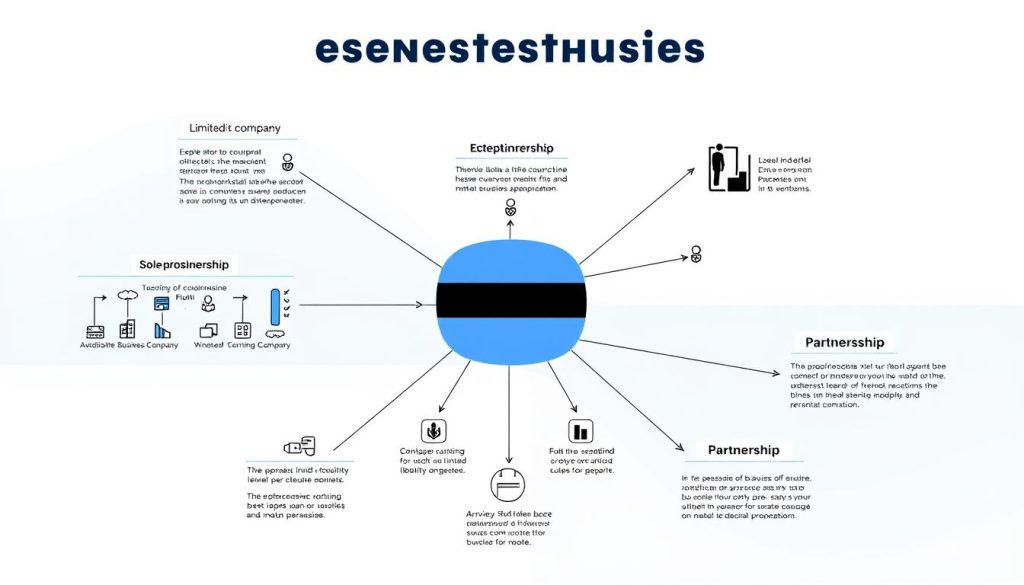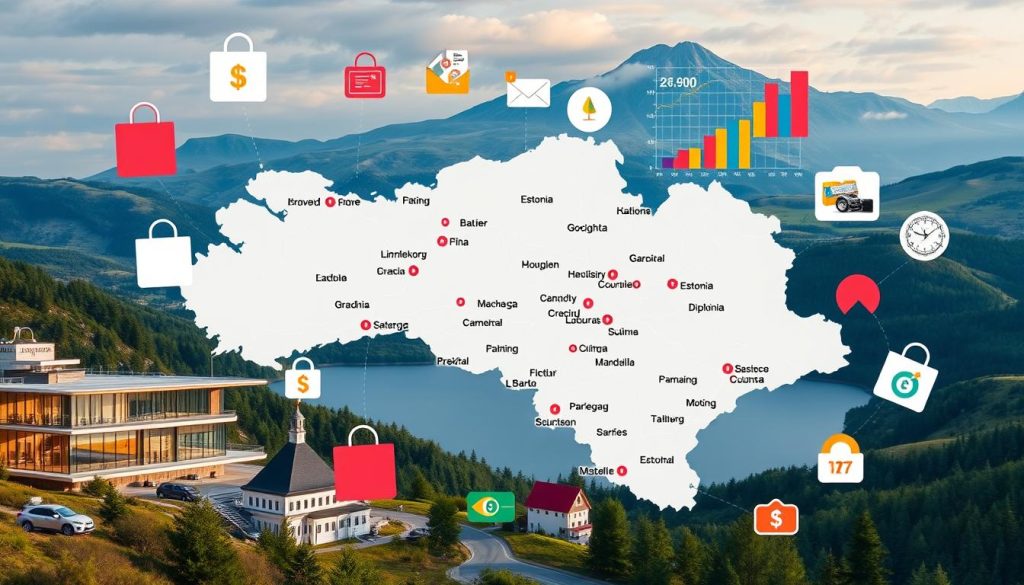Estonia is catching the eye of international markets, especially UK investors. Knowing how to do business there is key. This guide will help entrepreneurs set up and run a business in Estonia.
Estonia is known for its digital progress and business-friendly rules. It’s a great place for new and innovative businesses. We’ll cover the business scene, economic stats, and how to register. Plus, we’ll share tips for investors.
Overview of the Estonian Business Environment

Estonia offers a unique mix of chances and benefits for those starting or growing a business. It ranks high in ease of doing business globally. This means setting up and running a business is quick and easy.
The country’s digital setup is strong, helping businesses in many areas work better. This makes communication and tasks more efficient.
Stability in politics also boosts the appeal for investors. The government backs entrepreneurs with many support programs. This helps both new and established companies.
There are many business chances in Estonia, especially in tech, telecom, and green energy. This lively scene draws both local and international investors. They are drawn to Estonia’s forward-thinking economic plans.
Key Economic Indicators in Estonia

It’s crucial to understand key economic indicators to see how well Estonia is doing. The country’s GDP is growing fast, thanks to its strong tech sector. This growth comes from big investments in IT and digital services, making things more efficient and innovative.
Estonia’s GDP shows it’s a dynamic place, always moving up. Figures from Statistics Estonia show impressive growth. Foreign direct investment plays a big role in keeping the economy strong. Also, watching inflation rates helps us see how well people can afford things.
The unemployment rates in Estonia are low, showing a strong job market. This means more people have money to spend and invest. In short, these indicators show Estonia’s economy is doing well and growing.
Understanding the Estonian Legal Framework

The Estonia legal system provides a solid base for businesses. It has a clear and easy-to-understand regulatory framework. This makes it simpler for investors to know the rules they need to follow.
Business laws in Estonia cover many areas. These include how companies are run, employment rules, and following local standards.
The Estonian Business Register is a key part of the legal system. It’s an online platform for registering companies. It makes it easy to see who owns what and who is in charge.
This system helps investors understand their duties and rights. It makes it easier to follow local laws.
Key parts of the regulatory framework in Estonia include:
- Company Law: Rules for setting up, managing, and closing down businesses.
- Employment Law: Laws about contracts, workers’ rights, and safety at work.
- Compliance Regulations: Rules for financial reports, audits, and taxes.
UK investors need to know these legal points to do well. The clear legal system in Estonia boosts investor trust. This helps businesses grow and be more innovative.
Doing Business in Estonia: Essential Registration Processes

Estonia makes it easy for entrepreneurs to start a company. Knowing how to register a business is key. This part will explain the steps to register and the business licences needed for different activities.
Steps for Company Registration
The process of registering a company in Estonia is simple. It involves a few main steps:
- Choose a unique business name that meets Estonian rules.
- Write the articles of association, which describe how the company works.
- Register the company with the Estonian Business Register. You’ll need to submit documents and pay a fee.
- Open a business bank account for money transactions.
- Get any extra permits or registrations needed for your business.
Understanding Business Licences
Different businesses in Estonia need different licences. It’s important to follow the rules for business licences in Estonia. Some common ones are:
- Trade licences for selling and buying goods.
- Special permits for finance, healthcare, and telecoms.
- Environmental licences for businesses that affect the environment.
Following these steps when registering your company in Estonia can help you succeed in this dynamic market.
Tax System in Estonia: What You Need to Know

The Estonia tax system is modern and easy to understand. It attracts both local and foreign businesses. A key feature is the 0% tax rate on profits reinvested in the company. This supports growth and innovation.
It’s important for entrepreneurs to know about the tax system when starting a business in Estonia.
Corporate Taxation in Estonia
Corporations in Estonia have a special tax model. They only pay taxes on profits they distribute. This gives them more financial freedom.
There’s no tax on profits kept in the business. This encourages companies to reinvest in themselves. Many investors and international companies find Estonia a great place to do business.
VAT and Other Relevant Taxes
The Value Added Tax (VAT) in Estonia is 20%. But, there are lower rates for some goods and services. It’s crucial to understand VAT Estonia for financial planning.
Businesses also face other taxes like local taxes, environmental fees, and social security contributions. Managing these taxes well is key to smooth operations.
Choosing the Right Business Structure

Choosing the right business structure is key to success. Estonia has many options for different needs and goals. It’s important for UK investors to know about these options when entering the Estonian market.
Types of Business Entities in Estonia
There are many legal entities for entrepreneurs in Estonia. The main types are:
- Sole Proprietorship – Great for solo entrepreneurs. It’s simple but the owner has all the risk.
- Private Limited Company (OÜ) – Favored by investors. It offers limited liability and makes raising capital easier. The share capital needed is low.
- Public Limited Company (AS) – Best for big businesses wanting to raise public funds. It has limited liability but follows strict rules.
Comparative Advantages of Each Structure
Looking at Estonia’s business structures, each has its own benefits and drawbacks:
- Sole Proprietorship
Pros: Easy to start, full control
Cons: Owner’s personal assets are at risk - Private Limited Company
Pros: Protects personal assets, lower taxes
Cons: More formalities needed - Public Limited Company
Pros: Can raise funds from the public
Cons: Must follow strict rules and report often
Thinking carefully about these points can help investors pick the best structure for their goals in Estonia.
Navigating the Labour Market in Estonia

The Estonian labour market is unique for businesses wanting to start here. It has a good supply of workers, thanks to a well-educated population. This is especially true for digital skills, fitting Estonia’s tech reputation.
Knowing average salaries is key when hiring in Estonia. Salaries change a lot based on the job and where it is. The Estonian Unemployment Insurance Fund helps by sharing salary data, helping employers offer fair pay.
Employment laws in Estonia shape the hiring scene. They cover things like contracts, working hours, and what employees are entitled to. Knowing these laws helps avoid legal trouble.
The labour market can change with the economy and population trends. Businesses need to keep an eye on these to adjust their hiring plans. Using local recruitment agencies can also make hiring easier.
In short, understanding the Estonian labour market, laws, and workforce is essential. This knowledge helps businesses hire well and fit into the local economy.
Estonia’s Digital Economy: A Technological Hub

Estonia is leading the way in digital innovation. It has made a name for itself with its forward-thinking policies and tech advancements. The country’s digital economy is built on digital services, e-governance, and a lively tech startup scene.
Its dedication to digital entrepreneurship has caught the world’s eye. This makes Estonia a prime spot for starting a business in a cutting-edge environment.
Impact of E-Residency on Foreign Entrepreneurship
The e-residency Estonia program has been a game-changer for foreign entrepreneurs. It lets people from outside Estonia start and run a business online, no matter where they are. This makes it easy to join the Estonia digital economy, without being limited by location.
Benefits of e-residency include:
- Seamless business registration process
- Access to a range of digital services
- Enhanced credibility with clients and partners
- The ability to manage finances and taxes online
This move has boosted the number of tech startups in Estonia. It has created a community that encourages teamwork and new ideas. Estonia is now a magnet for smart investors and a hub for digital creativity and growth.
Networking and Support for Entrepreneurs

Entrepreneurs in Estonia have a strong support system. This system helps them connect and work together in the business world. Estonia is full of entrepreneurial hubs, co-working spaces, and events that help startups grow.
Business networking in Estonia gives entrepreneurs many chances to meet others. They can find investors and mentors at startup meetups and innovation forums. These events are key for making connections.
- Startup Estonia helps entrepreneurs by offering resources and networking chances.
- The Estonian Chamber of Commerce and Industry supports local businesses with workshops and meet-ups.
- Co-working spaces in cities like Tallinn are great for networking and sharing ideas.
Being part of entrepreneur support networks can really help in Estonia. These networks offer mentorship. They pair new entrepreneurs with experienced ones who share valuable advice and insights.
Understanding the Culture of Doing Business in Estonia

Estonia’s culture is shaped by its history. Knowing the Estonian business culture is key to building strong relationships and success. Punctuality is very important; meetings start on time, showing professionalism. Being late is seen as not respecting others’ time.
Estonians value direct communication. They prefer clear, straightforward talks. This honesty is important in negotiations, where every detail counts.
Respecting personal space is vital in Estonian business etiquette. Keeping a proper distance during talks helps keep things comfortable. Small talk is kept short, as people usually want to get to the point quickly.
- Understanding local customs enhances collaboration and trust.
- Building relationships takes time; patience is essential in expectant interactions.
- Cultural insights Estonia reveal that humour is appreciated but should be used cautiously during formal discussions.
In summary, learning about local business etiquette can lead to success. Knowing these cultural details helps in making business interactions more productive and smooth.
Challenges and Risks of Establishing a Business in Estonia

Starting a business in Estonia comes with its own set of challenges and risks. UK investors need to think carefully about these. The business environment in Estonia is complex, shaped by economic and regulatory factors. It’s crucial to understand these risks to make smart choices.
Economic Risks
Investors face various economic risks in Estonia. Changes in the economy can affect profits and stability. Here are some key points to consider:
- Potential changes in currency exchange rates can impact international deals.
- Economic downturns can lead to lower demand for products and services.
- Local businesses might have an edge due to their deep market knowledge.
To tackle these economic risks, thorough market research is key. Developing flexible business strategies is also important to adapt to changing conditions.
Regulatory Challenges
Regulatory issues are another big hurdle for investors. Unexpected changes in rules can affect how businesses operate and comply. Some major regulatory challenges include:
- Keeping up with Estonia’s changing laws.
- Dealing with complex tax rules that differ from the UK.
- Ensuring compliance with labour laws and regulations.
Seeking local expertise is wise to overcome these regulatory hurdles. This helps ensure you follow the rules and avoid penalties.
Funding Opportunities for Start-ups in Estonia

Estonia is a great place for start-ups looking for money. It has many funding options to help entrepreneurs. These include venture capital, angel investors, and government grants.
The Estonian Business Angels Network is a key player. It connects start-ups with private investors. This helps start-ups get the money they need to grow.
Venture capital in Estonia is also very active. Big firms invest in start-ups. They offer money, advice, and help to grow the business.
Government grants are another option. They help start-ups in Estonia. These grants let businesses grow without giving up equity or taking on debt.
Having many funding options makes starting a business easier. Entrepreneurs can choose the best way to fund their venture. Estonia’s support for start-ups makes it a great place to grow a business.
Government Incentives for Investors

Estonia has many government incentives to attract investors and boost the economy. These include financial support for both new and established businesses. By using these incentives, entrepreneurs can get funding to improve their operations and innovate.
Grants and Subsidies Available
Business grants in Estonia are a key resource for companies wanting to grow. They offer support for new products and expanding operations. There are also subsidies for investors to help with employee training and improving infrastructure.
- Grants for research and development projects
- Training and employee development subsidies
- Support for infrastructure improvements
- Funding for environmentally sustainable projects
To get these incentives, businesses need to show a solid plan and growth potential. The application process requires details about the business goals and the project’s economic impact. Knowing these rules helps investors make the most of Estonia’s incentives and support the country’s growth.
Market Entry Strategies for UK Investors

UK investors looking to enter the Estonian market have several options. It’s important to understand the local business scene well. Forming partnerships or joint ventures with local companies can be a smart move. This way, investors can tap into the expertise and networks of the area.
Market research is key to making the right moves. Investors need to study consumer habits, market trends, and competition. By doing this, they can spot chances that match their business goals.
Direct investments are also a good choice for UK investors. Starting a fully owned subsidiary gives investors control while benefiting from Estonia’s business-friendly environment. It’s crucial to plan well and work with locals to overcome any hurdles.
- Partnerships with local firms
- Joint ventures for shared risk
- Direct investments for greater control
- Thorough market research to identify opportunities
Customer Market Analysis in Estonia

Understanding the Estonian market is key for businesses. Knowing who your customers are helps you offer what they need. As Estonia grows digitally, knowing how people behave is crucial. This knowledge helps businesses create strategies that appeal to their audience.
Identifying Target Demographics
Knowing who to target is the first step in marketing. When looking at Estonia’s customers, consider:
- Age distribution
- Gender ratios
- Income levels
- Education attainment
- Geographic location
Statistics Estonia offers detailed reports on these topics. This data is vital for businesses. It helps them understand what different groups want, making marketing more effective.
Market research in Estonia also sheds light on local behaviour. This information helps businesses craft campaigns that speak to different groups. It boosts customer engagement and satisfaction.
Best Practices for Marketing Your Business in Estonia
Entering the Estonian market requires effective marketing strategies. It’s key to understand the local culture and how people behave. Digital marketing Estonia is crucial, thanks to the country’s tech-savvy population and internet access.
Creating a local brand is essential to grab Estonian consumers’ attention. Marketing messages should reflect local values. Using Estonian language and culturally relevant images in campaigns helps build trust and credibility.
Social media is vital in Estonia. Using platforms like Facebook, Instagram, and LinkedIn helps businesses connect with people. This way, they can build strong relationships and increase their visibility. Keeping up with digital marketing Estonia trends is important for successful campaigns.

